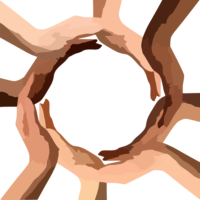Vosburg Seminar Award, Claremont University Consortium, 2016
Awarded to Graduate students who have shown an awareness and commitment to social justice in higher education…
Reflecting on the topic of social justice and the faith community, I immediately think about the controversy that the term social justice invokes. Some are concerned that the use of the word will detract from gaining the full attention of society when we speak to the injustices of country and the world. The Vosberg opportunity has opened a window for me to reflect on my life and make connections between my faith, social, political and environmental issues that face our nation. Most of all, asking the question, how does faith intersect social justice?
Growing up I had parents who served their communities in a variety of ways. My father was an educator and a high-school counselor and my mother worked for an organization that taught un-wed mothers life skills that would contribute to their future success. Witnessing their commitment to serving those who were marginalized, from low-socio economic conditions and ultimately contributing to the growth of their community was a significant influence in my own experience with social justice interests on race, inclusion and equity issues throughout my own education and work experiences.
Serving their community also meant actively participating in the teachings of the Catholic faith. My faith in relationship to my religious beliefs has grown as I became a mother and my children became of school age. I forgot how important my own parochial education was in developing the desire to help and advocate for others. When my oldest child was approaching school age, I realized the importance of faith, religious education and how this shapes us as citizens. I wanted this for my children. As a Catholic parent choosing a Catholic education for my children, I am reminded that future generations are learning daily how to work to care for the common good of others. They are learning, participating, engaging and leading social justice efforts in their school, neighboring and far-reaching communities.
Being a person of color, I grew up with awareness about the historical inequities our country as well as current awareness structural inequalities still in place. My parents always held high expectations for me and I was given a wide array of opportunities culturally and socially that contributed to my worldviews on equity. Once I entered the workforce, I witnessed inequities in a variety of contexts and I began to explore the field of teaching in higher education. Could this be a way for me to teach future leaders, managers, employees and community members to not only care for, but also stand up for tolerance, inclusion, and appreciating the benefits of diversity?
With a Masters Degree in Leadership & Management, I pursued working in a community college that provided a diverse community. Currently, in this environment, I work with underserved groups, abilities, religious affiliations, and other diverse groups. During this time, I am committed to expose “hidden curriculum” and give all of the knowledge that I have to increase the cultural and social capital of those who may be underserved and underprepared as they navigate through the education system that historically and presently has structural inequalities.
Wanting to take my teaching to another level, I decided to pursue a Ph. D. in Education. During my road to complete my Ph.D., I took a course called Social Justice in Education. This course gave me an “AHA” moment. The concepts and tenets of social justice seemed to be a natural fit with my interests and teaching philosophy. Social justice resonates with me as it intersects my identities as: an adjunct professor; a mother; a wife; a student; and in this moment a person of Catholic faith. The impact of the readings and the relationship to education inspired in me a “call to action.” Social justice is not a fad or an “initiative” to focus on for the year. It is a continuous commitment and a moral imperative to work for the common good of all people.
I realized that for all of these years of teaching, that I do it from an equity perspective. After more research and studying the literature about social justice, teaching is a platform to act as a change agent for equity. I infuse the tenets of social justice into every course that I teach, hoping to inspire others to the same “call to action.” Because of the significance about what social justice signifies, I determined that it is imperative to use a social justice framework for my dissertation.
My research explores how the experiences of biracial and multiracial students in higher education, contribute to their academic achievement. This research is critical to higher education as the number of individuals who are self reporting their multiracial identity has increased by 32% from the 2010 federal census compared to 2000. “The 2000 census marked a significant milestone for multiracial people” (Jones and Smith, 2001). These individuals will be making up the college bound population in the future (Renn 2000, Davis, 2009, Jaschik, 2006; Shang 2008). The benefit of this research to higher education is a stronger understanding about the complexities and consequences for colleges and universities about multi-ethnic identity, policies, programs and achievement data as it pertains to biracial and multiracial students. Colleges also become more prepared for understanding and working with students who have multiracial identities. Students will benefit as they will have a stronger sense of belonging, successful college experiences and outcomes that will assist them beyond their college career.
This research will use social justice as a theoretical lens for understanding the experiences and background of biracial and multiracial students. Using social justice ideology has been influenced by critical theory and critical race theory (CRT). Discussing a group who has only just been more recently and officially recognized nationally through the U.S. Census from a moral and equity viewpoint seems more than appropriate. Given the U.S.’ historical issues of race and racism, there is a natural underpinning of empowering a multiracial perspective in education.
As I reviewed the literature, there are several key tenets that emerged about social justice. This includes the need for social justice pedagogy across the curriculum; The ability to empower transformative leadership among college communities; The role of identity and transformative leaders; The need to create equity change agents; Reflection; The courage to speak up and raise equity consciousness; The ability to create a space for dialogue; The goal to transform classrooms and organizations and; most critically social justice as a moral imperative.
If we are to lead and transform education that is truly serving all equitably, we must discuss morality and how it corresponds into the social justice framework. Zajonc (2009) states, “without moral insight, we are not genuinely sensitive and responsive to inequity and injustice” (p. 81). When I think about this moral responsibility, as a Catholic, morals are in direct relationship with faith and my faith community.
As I saw this Vosburg opportunity, I was excited to see the words of social justice. But, the idea of a faith community and social justice reminded me about this critical new intersection to explore. But is this really new? Why haven’t I seen more in the literature about social justice and faith? The idea of morality is present, but perhaps because morals and faith is not necessarily tied together is the answer? Perhaps what is new for me is finding the courage to speak about faith and its relationship to social justice in the efforts to create a socially just academy. I have realized that sometimes I silence myself about my faith, because of secular rules and norms in public education. Creating solutions to various problems in a society that has become so secular that any reference to God is not politically correct can be challenging if your faith is inextricably tied to your religious beliefs. But, as I have researched social justice and faith a little deeper, I have realized that I do not need to convert someone to my specific religious beliefs. I can discuss the ideas of faith from the perspective that faith is our belief in whomever or whatever are beliefs. The faith in our beliefs, ultimately move us to do good things. Faith requires action. Leadership requires action. Social justice requires action. I too am action as a change agent for social justice. I think back in history and faith was a compelling force in many political and social movements during the 1960’s and 1970’s. And furthermore, my own Catholic religion’s social teachings are rooted in social justice.
Through the moral imperative of social justice, perhaps it will question secular viewpoints that have led to a very individualistic and material society and awaken the collective efforts needed to ensure equity for all. Moral obligations or moral reflection makes us look at ourselves deeply which ultimately leads back to one’s religious beliefs from my Christian perspective. We are motivated to be moral as a Catholic/Christian because of the beliefs we hold about God and carrying out how we treat others. So, perhaps if we can move away from the politicizing of the term social justice and think about it from the perspective of creating inclusive environments and equitable outcomes for all, there will be a resurgence in our country of what it means to be a faith community? Can we have faith without religious beliefs? Perhaps for those who believe in something or someone, Faith, from this perspective is that we hold common beliefs (despite religious specification) in truly working for the common good. But, for those of us who want to intertwine our faith and religious beliefs, we can still move social justice efforts forward with religion as an additional perspective. Working for the common good in the Catholic faith means creating social circumstances that enable humans to thrive. Social Justice.
I thank the Office of the Chaplain for sharing this opportunity with the Graduate School student community, not only for the possibility of receiving an award but for the opportunity to raise my own consciousness about how faith intersects with a topic that I am so passionate about. The chance for me to further explore the intersection between faith, my own religious teachings on social justice add to the complexity and richness of my active pursuits of a socially just academy as a researcher and educator.




